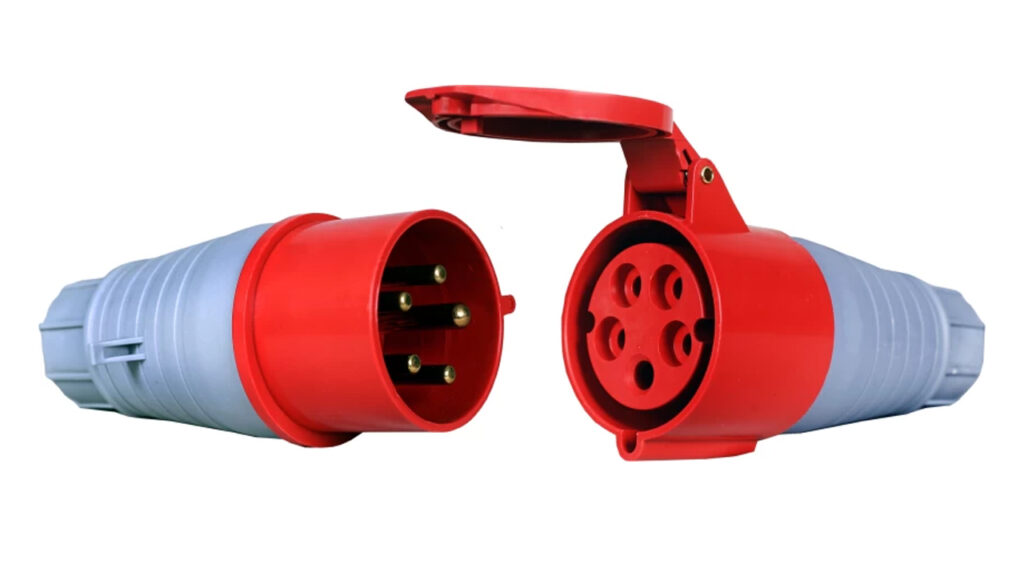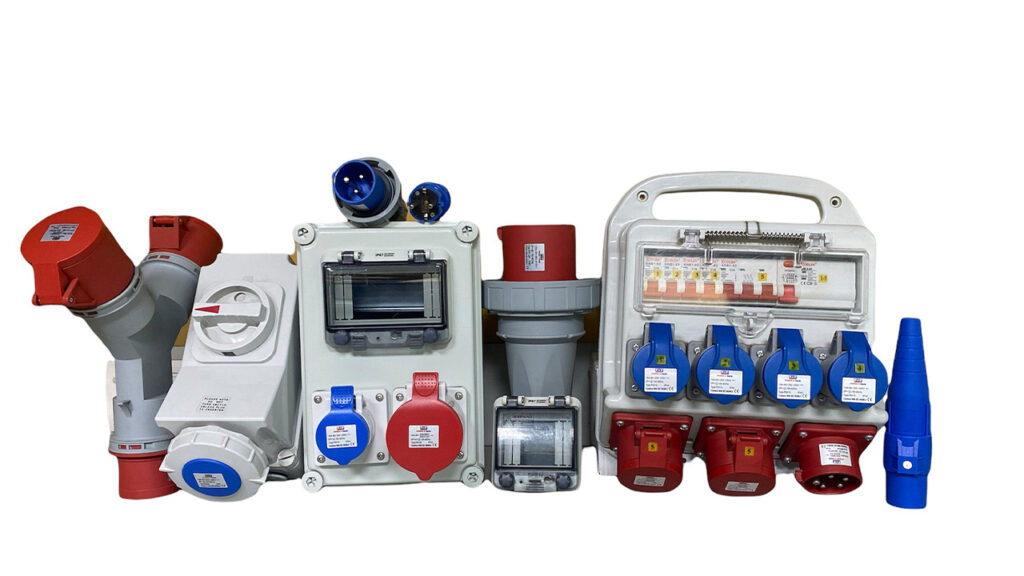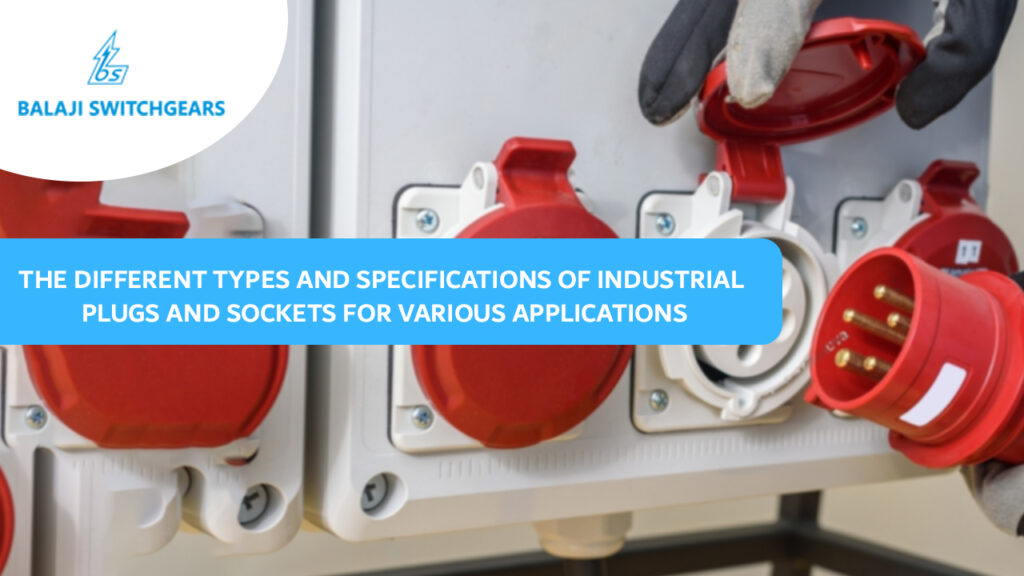Industrial plugs and sockets are electrical connectors that are designed to handle higher voltages and currents than household plugs and sockets. They are also more durable and resistant to environmental hazards such as dust, water, corrosion and physical impact. Industrial plugs and sockets are widely used in various industries such as manufacturing, construction, mining, oil and gas, and renewable energy.
Types of Industrial Plugs and Sockets
There are different types of industrial plugs and sockets based on the number of pins, the shape of the pins, the voltage and frequency ratings, and the degree of protection. The most common standard for industrial plugs and sockets is the IEC 60309, which specifies the color codes, dimensions and configurations of the connectors. Some of the types of industrial plugs and sockets based on the IEC 60309 standard are:
3-pin plugs and sockets: These are used for single-phase AC power supply, with one pin for live, one for neutral and one for earth. The voltage rating is 240V and the frequency rating is 50Hz or 60Hz. The color code is blue for IP44 (splash-proof) and white for IP67 (waterproof).
5-pin plugs and sockets: These are used for three-phase AC power supply, with one pin for each phase, one for neutral and one for earth. The voltage rating is 415V and the frequency rating is 50Hz or 60Hz. The color code is red for IP44 and black for IP67.
Interlocked sockets: These are sockets that have a switch or a circuit breaker that prevents the plug from being inserted or removed when the power is on. This ensures safety and prevents accidental disconnection. Interlocked sockets are available in 3-pin and 5-pin configurations, with voltage ratings of 240V or 415V and frequency ratings of 50Hz or 60Hz.
AC distribution box with socket: This is a box that contains one or more sockets and a circuit breaker or a fuse for each socket. This allows multiple devices to be connected to a single power source, with individual protection and control. AC distribution boxes are available in 3-pin and 5-pin configurations, with voltage ratings of 240V or 415V and frequency ratings of 50Hz or 60Hz. The color code is gray for IP40 (dust-proof).

Specifications of Industrial Plugs and Sockets
The specifications of industrial plugs and sockets depend on the type, size and rating of the connectors. Some of the common specifications are:
Current rating: This is the maximum current that the plug or socket can carry without overheating or damaging the contacts. The current rating is expressed in amperes (A) and ranges from 16A to 125A for industrial plugs and sockets.
Voltage rating: This is the maximum voltage that the plug or socket can withstand without breaking down or arcing. The voltage rating is expressed in volts (V) and ranges from 240V to 690V for industrial plugs and sockets.
Frequency rating: This is the frequency of the alternating current (AC) that the plug or socket can handle without affecting the performance or the lifespan of the contacts. The frequency rating is expressed in hertz (Hz) and ranges from 50Hz to 400Hz for industrial plugs and sockets.
Degree of protection: This is the level of protection that the plug or socket offers against the ingress of solid objects and liquids. The degree of protection is expressed by the IP code, which consists of two digits. The first digit indicates the protection against solid objects, such as dust or tools, and ranges from 0 (no protection) to 6 (dust-tight). The second digit indicates the protection against liquids, such as water or oil, and ranges from 0 (no protection) to 8 (immersion-proof).

Applications of Industrial Plugs and Sockets
Industrial plugs and sockets are used in various applications that require reliable and safe power connections. Some of the common applications are:
Manufacturing: Industrial plugs and sockets are used to connect machines, tools, robots, conveyors, and other equipment that require high power and durability. They also allow flexibility and mobility of the devices, as they can be easily plugged and unplugged as needed.
Construction: Industrial plugs and sockets are used to connect generators, compressors, pumps, welders, and other equipment that are used in construction sites. They also provide protection against harsh environments, such as dust, moisture, and impact.
Mining: Industrial plugs and sockets are used to connect drills, excavators, loaders, crushers, and other equipment that are used in mining operations. They also provide protection against extreme temperatures, vibrations, and explosions.
Oil and gas: Industrial plugs and sockets are used to connect pumps, valves, sensors, and other equipment that are used in oil and gas exploration and production. They also provide protection against corrosive fluids, flammable gases, and high pressures.
Renewable energy: Industrial plugs and sockets are used to connect wind turbines, solar panels, inverters, batteries, and other equipment that are used in renewable energy generation and storage. They also provide protection against weather conditions, such as rain, wind, and lightning.
Industrial Plug and Socket Supplier: Balaji Switchgears
If you are looking for a reliable and reputable supplier of industrial plugs and sockets in India, you can trust Balaji Switchgears. Balaji Switchgears is a leading technology partner that has been serving the industry since 1990. They offer complete solutions ranging from LV Switchgears to Automation requirements, which also includes industrial plugs and sockets, manufactured by Schneider Electric.. They also provide installation, commissioning, and maintenance services for their products. Balaji Switchgears has a pan-India presence and a global customer base, spanning across various sectors such as F&B, packaging, oil and chemical, defense, and government. They are committed to delivering quality products, excellent service, and green solutions to their clients.


Your blog about the different types of plugs is a comprehensive guide for professionals in industrial settings. The article delves into the intricacies of industrial plugs and sockets, offering valuable insights into their types and specifications. This resource serves as a valuable reference for ensuring optimal electrical connections in diverse industrial applications.
Thankyou Charlie! We are happy to see it help you significantly.
You should check out our website currently where we bringing to you more valuable Industry Insights.
Wow, amazing blog layout! How long have you been blogging for? you made blogging look easy. The overall look of your web site is magnificent, as well as the content!
Different types and specifications of industrial plugs and sockets cater to diverse applications. Consider current and voltage ratings, IP rating, materials, configuration, locking mechanism, and compliance with industry standards for optimal performance and safety.